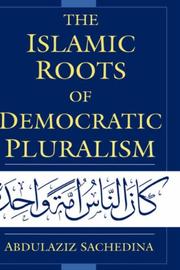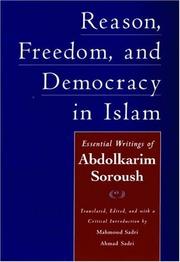| Listing 1 - 10 of 18 | << page >> |
Sort by
|
Book
ISBN: 9782952447188 2952447187 Year: 2007 Publisher: Paris: IIIT France,
Abstract | Keywords | Export | Availability | Bookmark
 Loading...
Loading...Choose an application
- Reference Manager
- EndNote
- RefWorks (Direct export to RefWorks)
Meditation --- Intellect --- Islam and reason --- Islam

ISBN: 9781591024491 1591024498 Year: 2007 Publisher: Amherst, N.Y. Prometheus Books
Abstract | Keywords | Export | Availability | Bookmark
 Loading...
Loading...Choose an application
- Reference Manager
- EndNote
- RefWorks (Direct export to RefWorks)
Faith and reason --- Islam and reason. --- Islam and science. --- Islam. --- Islam --- Sociology of religion
Book
ISBN: 1108756271 110861812X 1108621007 1108485316 Year: 2020 Publisher: Cambridge : Cambridge University Press,
Abstract | Keywords | Export | Availability | Bookmark
 Loading...
Loading...Choose an application
- Reference Manager
- EndNote
- RefWorks (Direct export to RefWorks)
In this book, Masooda Bano presents an in-depth analysis of a new movement that is transforming the way that young Muslims engage with their religion. Led by a network of Islamic scholars in the West, this movement seeks to revive the tradition of Islamic rationalism. Bano explains how, during the period of colonial rule, the exit of Muslim elites from madrasas, the Islamic scholarly establishments, resulted in a stagnation of Islamic scholarship. This trend is now being reversed. Exploring the threefold focus on logic, metaphysics, and deep mysticism, Bano shows how Islamic rationalism is consistent with Sunni orthodoxy and why it is so popular among young, elite, educated Muslims, who are now engaging with classical Islamic texts. One of the most tangible results of this revival is that Islamic rationalism - rather than jihadism - is emerging as one of the most influential movements in the contemporary Muslim world.
Faith and reason --- Islam --- Faith and reason (Islam) --- Islam and reason --- Islam.
Book
ISBN: 9782360136957 236013695X Year: 2023 Publisher: Paris: Riveneuve,
Abstract | Keywords | Export | Availability | Bookmark
 Loading...
Loading...Choose an application
- Reference Manager
- EndNote
- RefWorks (Direct export to RefWorks)
Loin des bruits et des fureurs de l’actualité, penser l’islam avec Souleymane Bachir Diagne invite à replacer le Coran et ses lectures dans l’histoire de la pensée en général. Car ici, l’islam n’est pas marginal : son discours inscrit dans l’universel la quête spirituelle qui engage les hommes à travers des millénaires. La réflexion du philosophe sénégalais qui enseigne à l’Université américaine de Columbia est ainsi orientée autour d’une religion dynamique, libératrice, promotrice des valeurs qui portent la citoyenneté, le vivre-ensemble dans le respect de la singularité de l’autre, bref dans le respect de sa différence. Elle souligne que ces valeurs, structurant désormais le cadre de la politique depuis la modernité, ne sont pas en dissonance avec les enseignements islamiques sur l’attention à autrui, sur le respect de toute vie, sur les préoccupations environnementales. Au contraire, sa pensée redessine la modernité du discours islamique, son actualité et sa vitalité dans un monde qui connaît de profondes mutations : économique, sociale, écologique, culturelle, technologique et scientifique. Voici une pensée essentielle pour les femmes et les hommes contemporains de bonne volonté.
Islamic philosophy --- Islam and reason --- Islam and philosophy --- Diagne, Souleymane Bachir

ISBN: 0195139917 0199848939 0195326016 0195349903 1280834897 9780195139914 9780195326017 Year: 2001 Publisher: Oxford Oxford University Press
Abstract | Keywords | Export | Availability | Bookmark
 Loading...
Loading...Choose an application
- Reference Manager
- EndNote
- RefWorks (Direct export to RefWorks)
Faith and reason --- Islam --- Rationalism. --- Religious pluralism --- Islam. --- Islam - 20th century. --- Religious pluralism - Islam. --- Religious pluralism - Islamic countries. --- Islam and reason.
Book
ISBN: 3956506898 3899135873 Year: 2007 Publisher: Ergon – ein Verlag in der Nomos Verlagsgesellschaft
Abstract | Keywords | Export | Availability | Bookmark
 Loading...
Loading...Choose an application
- Reference Manager
- EndNote
- RefWorks (Direct export to RefWorks)
Motazilites. --- Islam and reason. --- Islam --- Judaism --- Doctrines. --- Jewish theology --- Theology, Jewish --- Dogma, Islamic --- Islamic theology --- Kalam --- Muslim theology --- Theology, Islamic --- Theology, Muslim --- Moutazela --- Muʻtazila --- Muʻtazilah --- Mutazilites --- Islamic sects
Book
ISBN: 9004412867 9004412859 9789004412866 9789004412859 Year: 2019 Publisher: Brill
Abstract | Keywords | Export | Availability | Bookmark
 Loading...
Loading...Choose an application
- Reference Manager
- EndNote
- RefWorks (Direct export to RefWorks)
"In Ibn Taymiyya on Reason and Revelation, Carl Sharif El-Tobgui offers the first comprehensive study of Ibn Taymiyya's ten-volume magnum opus, Dar' ta'arud al-'aql wa-l-naql. In his colossal riposte to the Muslim philosophers and rationalist theologians, the towering Ḥanbalǐ polymath rejects the call to prioritize reason over revelation in cases of alleged conflict, interrogating instead the very conception of rationality that classical Muslims had inherited from the Greeks. In its place, he endeavors to articulate a reconstituted "pure reason" both truly universal and in full harmony with authentic revelation. Based on a line-by-line reading of the entire Dar' ta'arud, El-Tobgui's study carefully elucidates the "philosophy of Ibn Taymiyya" as it emerges from the multifaceted ontological, epistemological, and linguistic reforms Ibn Taymiyya carries out".
Faith and reason --- Islam and philosophy. --- Islam. --- Ibn Taymīyah, Aḥmad ibn ʻAbd al-Ḥalīm, --- Philosophy and Islam --- Philosophy --- Faith and reason (Islam) --- Islam and reason --- Islam and philosophy --- Islam --- E-books --- Islamic & Arabic philosophy
Book
ISBN: 9004290958 9789004290952 9789004290945 900429094X Year: 2015 Publisher: Leiden Boston
Abstract | Keywords | Export | Availability | Bookmark
 Loading...
Loading...Choose an application
- Reference Manager
- EndNote
- RefWorks (Direct export to RefWorks)
This volume offers an account of Abū Ḥāmid al-Ghazālī (d. 505/1111) as a rational theologian who created a symbiosis of philosophy and theology and infused rationality into Sufism. The majority of the papers herein deal with important topics of al-Ghazālī’s work, which demonstrate his rational treatment of the Qurʾān and major subjects of Islamic theology and everyday life of Muslims. Some other contributions address al-Ghazālī’s sources and how his intellectual endeavors were later received by scholars who had the same concern of reconciling religion and rationality within Islam, Christianity and Judaism. With contributions by Binyamin Abrahamov, Hans Daiber, Ken Garden, Avner Giladi, Scott Girdner, Frank Griffel, Steven Harvey, Alfred Ivry, Jules Janssens, Taneli Kukkonen, Luis Xavier López-Farjeat, Wilferd Madelung, Yahya M. Michot, Yasien Mohamed, Eric Ormsby, M. Sait Özervarlı, and Hidemi Takahashi.
Faith and reason --- Practical reason. --- Rationalism. --- Knowledge, Theory of --- Religion --- Belief and doubt --- Deism --- Free thought --- Realism --- Practical rationality --- Practical reasoning --- Rationality, Practical --- Reasoning, Practical --- Reason --- Faith and reason (Islam) --- Islam and reason --- Islam. --- Ghazzālī,

ISBN: 0199880875 1280472049 0195351916 1423760328 9780195351910 9781423760320 9781280472046 9786610472048 6610472041 9780195128123 0195128125 0195128125 9780195158205 0195158202 0197740685 Year: 2000 Publisher: New York (N.Y.) : Oxford University Press,
Abstract | Keywords | Export | Availability | Bookmark
 Loading...
Loading...Choose an application
- Reference Manager
- EndNote
- RefWorks (Direct export to RefWorks)
"In recent years 'Abdolkarim Soroush has emerged as one of the leading revisionist thinkers of the Moslem world. Supporters and critics alike have called him the Martin Luther of Islam - a man whose ideas on religion and democracy could bridge the chasm between Moslem societies and the rest of the world. Soroush and his contemporaries in other Moslem countries are shaping what may become Islam's equivalent of the Christian Reformation: a period of questioning traditional practices and beliefs and, ultimately, of upheaval." "This book features eleven of Soroush's essays translated into English for the first time, a new critical introduction by the editors, and an original interview that reveals the intellectual biography of Soroush. Offering a timely corrective to the common view of Islam as monolithically reactionary, this book will be of great interest to students and scholars of the Middle East and Islam and politics both here and abroad."--Jacket.
Faith and reason --- Liberty --- Democracy --- Islam and state. --- Mosque and state --- State and Islam --- State, The --- Ummah (Islam) --- Freedom (Islam) --- Faith and reason (Islam) --- Islam and reason --- Islam. --- Religious aspects --- Islam and state --- Islam --- Faith and reason - Islam --- Liberty - Religious aspects - Islam --- Democracy - Religious aspects - Islam --- Démocratie --- Foi et raison --- Islam et philosophie. --- Islam et raison. --- Islam et État. --- Liberté (islam). --- Liberté --- Politieke aspecten. --- Aspect religieux --- Islam and reason.
Book
ISBN: 9781848850613 1848850611 Year: 2011 Volume: 5 Publisher: London I.B. Tauris
Abstract | Keywords | Export | Availability | Bookmark
 Loading...
Loading...Choose an application
- Reference Manager
- EndNote
- RefWorks (Direct export to RefWorks)
Since the earliest period of Islamic history, Arab thought and reason has been dominated by a reverence for tradition and textual analysis. In this groundbreaking work, the great contemporary Arab philosopher Mohammed Abed al-Jabri seeks to chart a course towards modernity via the proposition that respect for textualism and tradition are not inconsistent with rationalism, and that both history and philosophy are key to the evolution of knowledge systems and ways of reasoning in Arab culture. Al-Jabri dissects the systems through which knowledge is obtained and verified in Arab thought, and demonstrates their fundamental bias towards analogical reasoning and premodern authoritative referents, some of which are inherently resistant to empirical analysis. In an impassioned defence of rationalism, he argues that these textual reference points must be interpreted and mediated with critical analytical tools. He advocates an evolution of Arab thought to accommodate the changeability of values, interpretations and structures over space and time, to escape an a-historical imprisonment. Since the earliest period of Islamic history, Arab thought has been dominated by a reverence for tradition and textual analysis. In this groundbreaking work, the great contemporary Arab philosopher Mohammed Abed Al-Jabiri seeks to chart a route towards modernity via the proposition that respect for textualism and tradition are not inconsistent with rationalism and that both history and philosophy are key to the evolution of knowledge systems and ways of reasoning in Arab culture. This book has been an enormous influence within the Arab world on the 'Islam and Modernity' discourse. It is published here for the first time in English and provides a fascinating insight into the currents of contemporary Arab thought.
Philosophy, Arab --- Islam and philosophy. --- Islam and reason --- Islamic modernism. --- Philosophie arabe --- Islam et philosophie --- Islam et raison --- Modernisme islamique --- History. --- Histoire --- Faith and reason -- Islam. --- Philosophy, Arab -- History. --- Islam and reason. --- Islamic modernism --- Islam and philosophy --- History --- Philosophy, Arab - History --- Philosophy, Arab - 20th century --- Faith and reason --- Islam --- 165.63 --- 1 <=927> --- Modernism, Islamic --- Faith and reason (Islam) --- Philosophy and Islam --- Philosophy --- Arab philosophy --- Arabic philosophy --- Philosophy, Arabic --- 1 <=927> Arabische, islamitische filosofie --- Arabische, islamitische filosofie --- 165.63 Rationalisme. Intellectualisme. Aufklärung. Verlichting. Enlightenment --- Rationalisme. Intellectualisme. Aufklärung. Verlichting. Enlightenment
| Listing 1 - 10 of 18 | << page >> |
Sort by
|

 Search
Search Feedback
Feedback About UniCat
About UniCat  Help
Help News
News